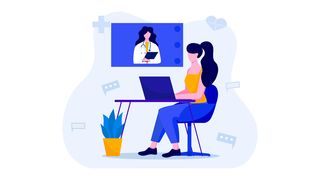Anxiety
Crazed by Coronavirus (Literally)
From no history of anxiety to daily panic attacks, here’s what I did next.
Posted May 3, 2020 Reviewed by Ekua Hagan

When the quarantine first started, I thought it would be nice, in a way. As an introvert who travels almost constantly for work—something that I love, but also find exhausting at times—I was relieved to finally get to spend some time at home. I envisioned quality time with my daughter, age 6; finally, the ability to add fitness to my schedule and keep it; time to take my cooking to a new level; no lost energy and productivity to time zone changes, packing, airport travel ... maybe we'd finally even have time to get a dog! Yeah! While the circumstances leading to my time at home were grim, like many people, I was full of hope that I would be able to make the most of this time in quarantine.
Also like many people, the opposite has been true for me. Working from home, there have been days where I’m lucky if I can find five full minutes to pay attention to my daughter. I still cook but lack the energy to level up much of anything. I have exercised once since quarantine began, and every day seems so full that I can scarcely imagine where I might have made time for fitness.
Perhaps the biggest surprise of all has been the impact that quarantine has had on my mental health. About a week into quarantine, I started to have trouble sleeping. A week later, trouble sleeping turned into waking up panicked, jolted from a vivid, realistic dream into real life so abruptly that I was unsure what was real.
A week after that, panic attacks at night turned into panic attacks during the day. By the end of week four, I had a panic attack during a high-pressure work call, and by the end of that week, I was taking some "unplanned PTO" from work, unsure what to do with myself but knowing that the new status quo could not continue.
It almost seems silly to articulate the worries that were creating this mountain so high that I found myself in a state of panic. Take inventory of your worries and input them here; it’s the same difference. My list of worries goes on and on, so much that it feels like I may drown in them if I stop swimming for even a second.
If something gets me thinking about it, really thinking about it—and that’s not hard to do with social media, the news, and anyone I talk to all eager to talk about COVID-19—the panic looms. I feel the tightness in my chest, the shortness of breath, just writing this paragraph. In the span of a few weeks, I had gone from having no history of anxiety to widespread general anxiety and daily panic attacks.
In clinical psychology, something is only considered a disorder if it brings distress and impairs your functioning, and I suspect a lot of people have entered this “clinical” range since February 2020. I am writing this piece exactly because I believe that many people are currently experiencing clinical levels of anxiety for the first time and that now is a very important moment to educate, inform, and empower people to take action.
Without good ways of tackling anxiety, we cope any way we can—by drinking, shopping, binge-watching TV, playing video games, or otherwise distracting ourselves. If there’s one thing I took away from the neuropsychology classes I've taken, it’s that what you do repeatedly becomes ingrained. The longer this panic persists, and the longer I go on failing to cope, or coping in unhealthy ways, the harder it will be for me to unlearn. Right now, when anxiety may be brand new, is the best possible time to unlearn it. In this uncertain time, where many are experiencing new heights of anxiety, it is important to learn new skills for coping with anxiety quickly, before anxiety becomes “the new normal.”
Though I'm not a practicing clinician, as a psychologist, I was trained in the treatment of various forms of anxiety in graduate school. I knew that the following options could potentially help with this gut-wrenching anxiety: going on medication, receiving psychotherapy, and using self-help tools.
The first two can be achieved using telemedicine (I happened to have used Doctor on Demand, which is supported by my health plan, but there are many services like this and each health plan supports something different). The last requires a slog through the massive sea of self-help and digital therapeutic platforms out there, which is no easy task.
I will admit a bias here because I am chief scientist of one such platform (Happify), but a lot of digital therapeutics companies are providing free self-help content right now (Happify included), so the landscape for research-based self-help tools has never been more lush.
If you are trying to separate the wheat from the chaff when it comes to therapy and self-help that is research-based, here are some phrases to look for: cognitive behavioral therapy, mindfulness-based stress reduction, interpersonal psychotherapy, diaphragmatic breathing/vagal stimulation, positive psychotherapy/positive psychology, and interoceptive exposure (for panic in particular).

Given the severity of the anxiety I was experiencing, I opted to try all three. Armed with new medications, a therapist who gets that I am here to tackle this anxiety thing hard and fast, and a set of tools to help me engage in new behaviors (made possible only by the miracle of telemedicine and digital therapeutics), I found some tools that I feel have potential to work for me.
Medication helps turn down the volume knob on my anxiety so that it's (mostly) at a level I can manage. Therapy teaches me skills to cultivate in order to fight my anxiety. The digital self-help tools help me actually use those skills on a regular basis, turning them into habits.
My point here is not at all to tell everyone feeling COVID-19 anxiety to use medication, or seek therapy, or anything else (though I do hope that whatever you do, it’s research-based and research-tested!). Rather, I hope to legitimize the experience of anxiety right now and highlight some of the different options out there to get help.
You are not alone, and even though things are—really, really are—totally different, when it comes to mental health, coronavirus doesn’t have to keep you from getting the help you need.




